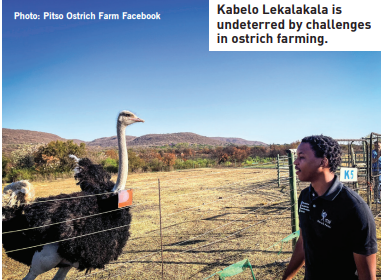It has been a challenging five years for an aspiring ostrich farmer who has been striving to get his big break in serving a niche market and securing a stake in the multi-million-rand industry.
Located in Brits in the North West, Pitso Ostrich Farm run by Kabelo Lekalakala, is now home to 13 indigenous black-neck ostriches.
The 35-year-old launched his business in 2019, after learning about the bird’s value chain in Oudtshoorn, Western Cape, a town renowned for ostrich production and farm tours, where he worked as an Enterprise Development Practitioner.
It was an encounter with a client that prompted him to explore the local industry.
Lekalakala said South Africa is the leading producer of the world’s ostrich products.
“This client had a wealth of experience in tanning leather, which is a process of getting the leather from a raw state until it’s finished and ready to produce bags and belts for luxury brands.”
The interaction with the client and the lack of ostriches to create the leather product, made Lekalakala want to explore this industry.
“It hit me that I need to be an ostrich farmer so that we can have a constant supply of quality and sufficient leathers to supply to this guy.”
Soon after that, Lekalakala received a transfer and moved back to his hometown in Brits with only 17 ostrich chicks that he bought for R3 500.
“I extended the chicken house at home and put my ostriches there… I knew nothing about ostriches. I had to Google.”
Two months later, some birds started dying because of inadequate infrastructure.

Despite this setback, Lekalakala was determined to dispel the myth that these birds can only live in the Western Cape.
Lekalakala eventually acquired a five hectare farm through a bond commitment, after selling his car to improve his credit score.
The high costs and bureaucratic hurdles of complying with regulations, such as water quality tests and biosecurity measures, have become a common challenge.
“That farm 'chows' 60% of my salary and that’s the bond alone. And the electricity and rates keep rising and then it’s the feed and the medication. Do you understand now the economic and emotional toll it is taking [on me]?'
He also has an employee he pays from his salary since the business sells ostrich eggs which do not make a profit.
Lekalakala bemoaned the unequal government support for ostrich farming, emphasising that the industry is largely controlled by white farmers in the Western Cape.
The farmer is now appealing to the Department of Agriculture, Land Reform and Rural Development for support, having exhausted other avenues.
Despite these challenges, he remains hopeful and continues to pursue his farming venture, aiming for ostrich tourism as a potential future income source. ¥
For more information logon to Facebook and visit Pitso Ostrich Farm page. Kabelo Lekalakala can be reached on pitsoostrichfarm@gmail.com

 Facebook
Facebook Twitter
Twitter WhatsApp
WhatsApp